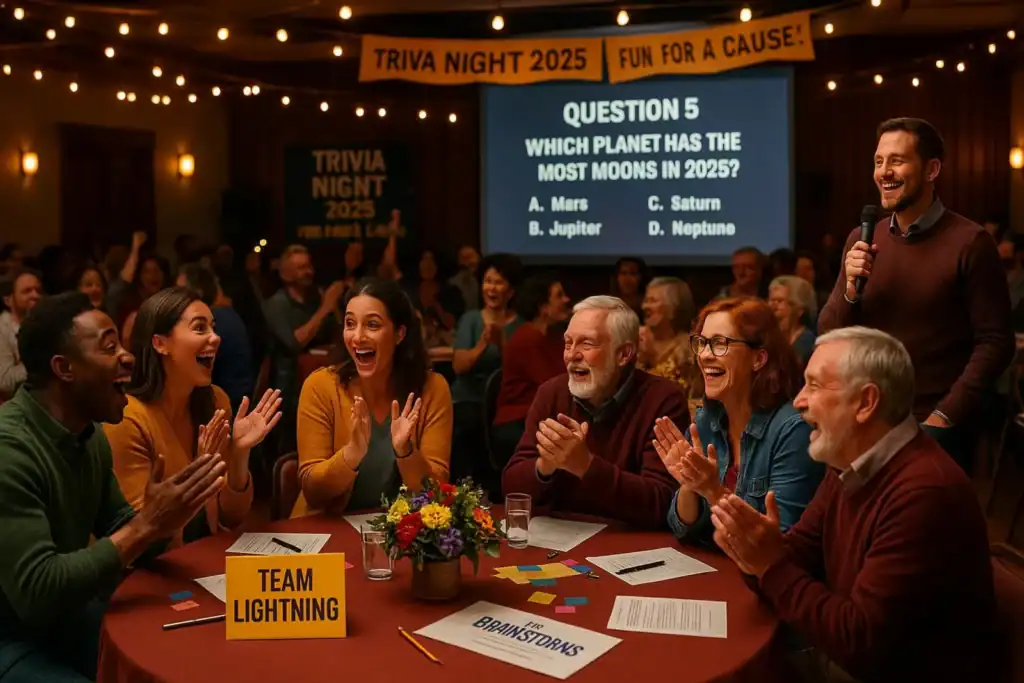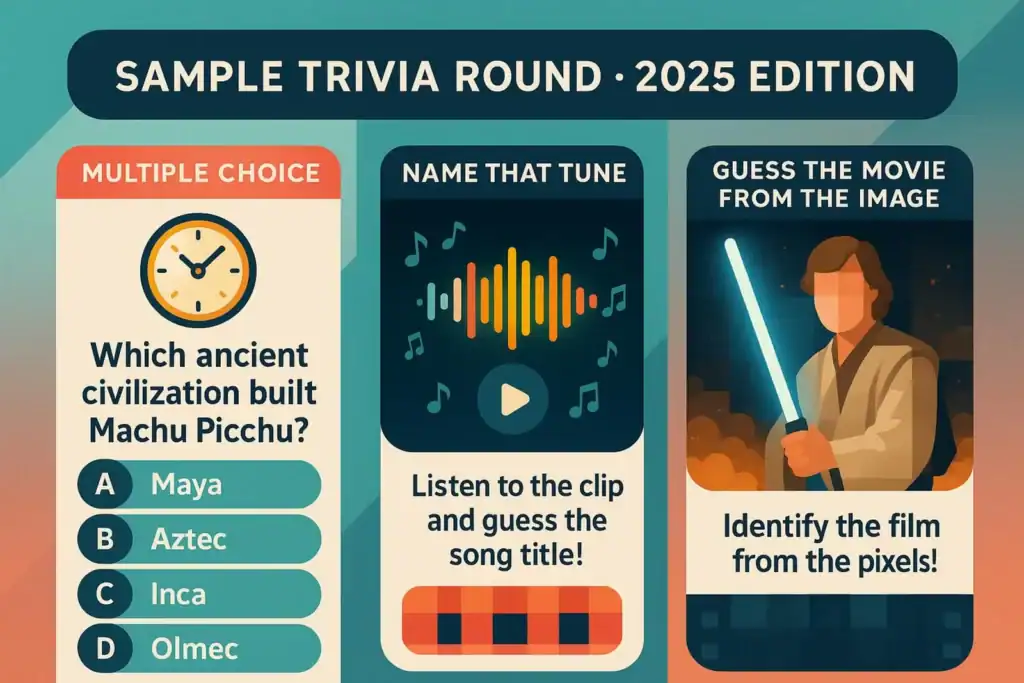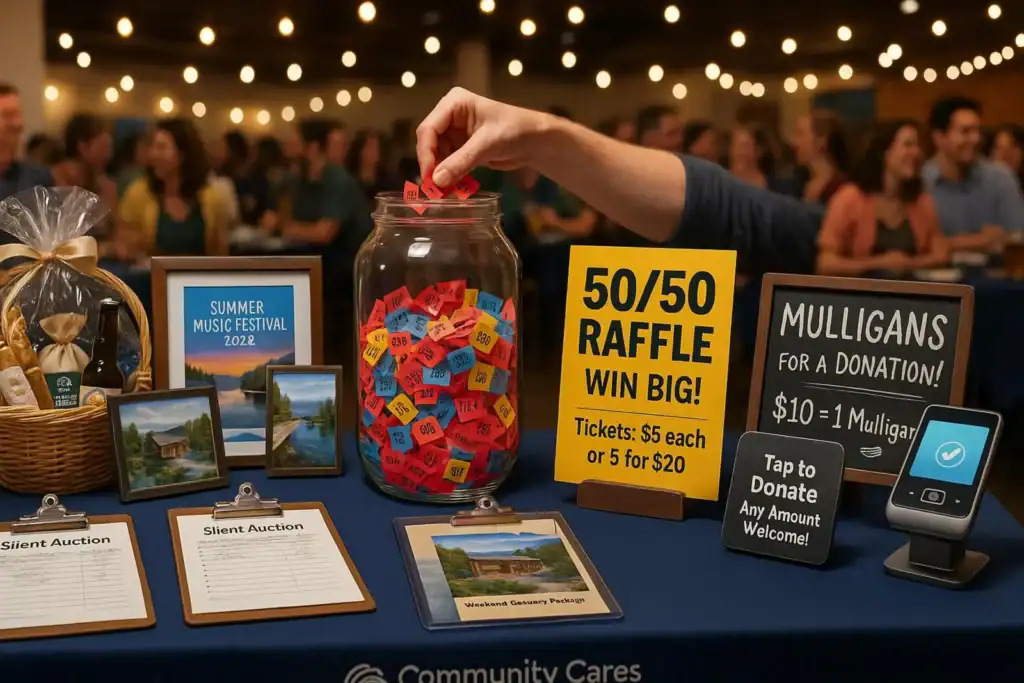Wondering if a trivia night can really raise money? Yes, it can. Trivia night fundraisers have grown fast and are now a favorite for charities, schools, clubs, and companies. They mix fun, community spirit, and income in one event. This guide covers every part of planning and running a great trivia night so your event is enjoyable and brings in strong results.
What are Trivia Night Fundraisers?
A trivia night fundraiser is a live quiz where teams answer questions across many categories. The big difference from a regular pub quiz is the cause at the center. People are playing for fun and to support something that matters, which makes the night more meaningful and memorable.
Key features that define a trivia fundraiser
- Team play: groups compete, building teamwork and friendly rivalry.
- Wide range of topics: questions cover many subjects so everyone can help.
- Clear purpose: the cause and funding goal are front and center all night.
Events often add extra ways to give: entry fees, raffles, silent auctions, and “mulligans” (teams donate to mark a question correct). These extras turn a simple quiz into a strong money-maker.

Differences between traditional trivia nights and fundraisers
Both formats test knowledge, but the goals differ. Bar or restaurant trivia focuses on a fun night out, maybe with a small prize. The venue keeps most of the income.
Fundraiser trivia blends fun with giving. Tickets and side activities bring in money for a cause. The vibe stays playful and competitive, but people also feel good about helping.
| Aspect | Traditional Trivia | Fundraiser Trivia |
|---|---|---|
| Main goal | Entertainment | Raise money for a cause |
| Revenue | Goes to venue | Goes to organization/cause |
| Activities | Quiz only, small prizes | Quiz plus raffles, auctions, mulligans |
| Atmosphere | Casual competition | Fun with shared purpose |
Who can benefit from hosting a trivia fundraiser?
Almost any group can run one. Schools can pay for clubs or equipment. Faith groups can fund outreach or building needs. Clubs can support projects. Businesses can boost staff engagement while giving back.
It’s flexible and budget-friendly. You can set themes and question styles that fit your audience, which helps draw a crowd and reach your goals.
Benefits of Hosting a Trivia Night Fundraiser
Trivia fundraisers do more than bring in money. They help build community, grow relationships, and create a night people remember.
Engages communities and supporters
Trivia is social by nature, and adding a cause deepens the connection. People feel part of something bigger, whether they’re teaming up or competing with a smile. It’s also a low-pressure way to introduce new people to your mission and turn them into long-term supporters.
Because many ages and backgrounds enjoy trivia, you can attract a broad group. That wider reach means more attention for your cause.
Aids team-building and social interaction
Teams share knowledge, discuss, and plan. It’s great for company groups or clubs that want a fun outing with impact. Beyond the teams, breaks and score updates lead to mingling and new connections.
Generates revenue for charitable causes
Trivia nights are often low-cost to run and can bring in strong returns. Tickets start the income, and extras like mulligans, raffles, and auctions boost it. One good event can set the stage for a series that supports your budget all year.
Popular Types of Trivia Night Fundraisers
You can host trivia in many formats. The one you choose affects turnout, planning needs, and the feel of the night.
In-person events
Classic in-person trivia is still a favorite. Community centers, school gyms, restaurants, and pubs all work well. The energy in the room-groans for missed answers and cheers for wins-creates a special buzz.
It’s easy to add raffles, silent auctions with items on display, and food and drink sales. Sponsors can show their logos on materials or sponsor tables. You will need to plan for space, staff, and crowd flow.

Virtual or hybrid trivia events
Online events let you reach people who can’t attend in person. They’re easy to join from home and help you bring in supporters from anywhere.
Hybrid events mix both styles: some teams gather on-site while others join online. You’ll need reliable platforms and clear instructions, but these events are flexible and can be cost-friendly.
Themed trivia nights
Themes add focus and fun. All questions tie to a topic and draw fans eager to play. Ideas include “Decades,” “Star Wars,” “Marvel Movies,” “Sports Fanatics,” or a theme linked to your cause (like “Furry Friends” for an animal shelter).
A theme guides your decorations, marketing, and question writing. Picture and audio rounds fit well and make the night stand out.
Corporate and community organization fundraisers
Companies can use trivia for team-building while supporting a charity. They can sponsor tables, invite staff to play, and compete with other businesses. This taps into giving budgets and grows relationships.
Local groups-Rotary, Lions, and others-can raise funds for projects. These events often draw help from nearby businesses for sponsorships and prizes.
Step-by-Step Guide to Planning a Trivia Night Fundraiser
Running a great trivia night takes planning and good follow-through. Think of it as a game where each step helps you reach your goal. Here’s a full guide to help you handle the process.
1. Setting clear goals and budget
Start with your purpose and target amount. What will the money support-new playground gear, animal rescue, or a public art project? Use SMART goals (Specific, Measurable, Attainable, Relevant, Time-bound). For example, “Raise $5,000 for textbooks by the end of next quarter” is better than “raise money.”
Create a detailed budget. List costs (venue, questions, sound, décor, marketing, prizes) and your expected income (tickets, sponsors, extras). A realistic plan helps you stay on track and make a solid profit.
2. Forming an organizing committee
Build a team. Look for people with different strengths: logistics, creative ideas, sponsor outreach, and budgeting. Assign roles and hold regular check-ins so tasks move forward. A reliable committee is the backbone of the event.
3. Selecting the ideal date, time, and venue
Pick a date and time that fits your audience. Weekends often work well. Avoid major holidays and other big local events. Trivia is usually indoors, so you have flexibility year-round.
Decide on in-person, virtual, or hybrid. For in-person, choose a space that fits your crowd and extras. Community centers, school halls, and partner restaurants or breweries are good options. For online, pick a stable platform and clear channels for communication.
4. Choosing a trivia night theme and format
A theme can lift your event. Choose one that fits your audience or your cause, like “Decades,” “Sports Mania,” or “Pop Culture.”
Set the format: number of rounds, questions per round, special rounds (audio or picture), how answers are turned in, and how points work. A clear structure keeps the night moving.
5. Developing trivia questions and rounds
Questions are the core of your event. Keep them accurate, fun, and varied in difficulty. Mix easy, medium, and hard questions so everyone can join in. A common approach per category is 3-4 easy, 3-4 medium, and 2-3 hard.
Plan 6-7 rounds with about 10 questions each across history, science, pop culture, geography, and current events. Add audio or picture rounds to mix it up. For themed events, match questions to the theme. You can write your own or buy ready-made sets from trusted vendors like Quizrunners, which may include auto-scoring.

6. Deciding on team size and rules
Clear rules make for a smooth night. Choose a team size cap (6 is common). Use a “no phones” rule to prevent cheating. Explain scoring, how to submit answers, and time limits.
Plan tie-breakers ahead of time. A guess-based question (like “How many jellybeans are in the jar?”) works well. Give teams a printed rule sheet at check-in.
7. Planning food, beverages, and other logistics
Trivia can run for hours, so plan for snacks and drinks. Options include selling refreshments, bundling them with a higher-priced ticket, or letting guests bring their own (if allowed). BYO often saves time and money.
Set up a host area, a mic and speakers for big rooms, numbered tables, and a projector and screen if using visuals. Have a registration table for check-ins and materials.
8. Arranging prizes and incentives
Prizes add excitement. Beyond gift cards, try cash, a share of funds raised, tickets to other events, or donated items from local businesses like tours or show tickets. Display prizes where everyone can see them.
9. Recruiting volunteers and hosts
You’ll need helpers for check-in, scoring, refreshments, raffles, and auctions. A lively emcee sets the tone, reads questions, keeps pace, and can make appeals. A local radio host or community figure can help draw interest.
Strategies to Maximize Fundraising at Your Event
Tickets are just the start. The best results come from adding more ways to give and making it simple to take part.
Sponsorships and local partnerships
Sponsors can cover costs and add credibility. Offer tiered options, such as:
- Round Sponsor: logo on answer sheets and a shout-out during the round
- Activity Sponsor: covers a wine pull, balloon pop, or similar game
- Food & Beverage Sponsor: provides or sells refreshments and shares proceeds
Ask for in-kind donations for prizes and auction items. A short online sponsor form makes sign-up easy. Show how sponsors gain visibility and goodwill.
Ticket pricing and sales options
Plan your pricing. Will you sell single tickets, team tickets, or whole tables? Team tables often bring in new guests through friends and family. Singles can work too. A mix of both, with “singles” tables priced slightly higher per person, can cover all needs.
Sell online for convenience. Use a platform that supports multiple ticket types, limits, deadlines, simple tax receipts, and QR or numeric check-in codes.
Raffles, auctions, and donation activities
Extras can add a lot of income. A 50/50 draw is a favorite. Sell raffle tickets throughout the night. A silent auction with bidding after each round keeps interest high.
Offer mulligans for a donation so teams can mark a few questions correct. Try a wine pull or balloon pop with mystery prizes. Set up a donation station with tap-to-pay or mobile options so giving is quick.

Merchandise and add-ons
Sell branded items tied to your group or theme-shirts, mugs, or small novelties. Themed snacks or drinks can also sell well. These items bring in extra cash and give guests a keepsake.
Promoting Your Trivia Night Fundraiser
Even a carefully planned event needs strong promotion. Get the word out, build excitement, and make sign-up simple.
Using social media and digital marketing
Use Facebook, Instagram, and X for low-cost reach. Share bold visuals and sample questions. Explain the cause, prizes, and theme.
Send email updates to your list with key details and a direct ticket link. Create an event page on your website. Ticketing tools can generate QR codes for quick access and promo codes for discounts or comps.
Leveraging community networks and local media
Tap local groups, schools, and businesses to spread the word. Post flyers on community boards, in cafes, and at libraries. Place a small ad in the local paper. Ask radio stations to mention your event or host a short interview, especially for charity-focused stories.
If your emcee is a known local figure, ask them to promote it on their channels.
Encouraging word-of-mouth and team participation
Ask your committee, volunteers, and early buyers to invite friends and coworkers. Highlight the team format in your marketing so people form groups and bring others along.
Share teasers-category hints, prize reveals, or fun facts about your cause-before the event to build buzz.
Tips for Hosting a Fun and Successful Trivia Fundraiser
The big night is where planning pays off. A smooth, friendly, and upbeat event keeps people coming back and supporting you again.
Crafting entertaining and fair questions
Aim for balance and variety. Challenge players without making them give up. Skip overly obscure topics unless your theme calls for it. Make sure answers are correct and questions are clear to avoid disputes. Have someone else review the quiz for flow and accuracy.
Add short facts when revealing answers to make learning fun. Use the occasional wildcard, audio clip, or image to keep things fresh.
Maintaining a lively atmosphere
A great emcee matters. They should be upbeat, friendly, and able to keep things moving. Music between rounds helps energy, and clear announcements keep everyone informed.
Set the room for comfort and teamwork. Seat teams so they can talk easily. In large or noisy rooms, good sound is a must. Dim lights during visual rounds so screens are easy to see.
Making scoring seamless and transparent
Slow scoring can drain energy. Assign a scorer or use a digital tool. For small events, organized paper score sheets work fine. Speed and accuracy are key.
Transparency also matters. Show standings often so teams can track progress. If there’s a dispute, handle it calmly, review the sheet, and explain your decision. Have a simple process ready to go.
Adapting for different group sizes or audiences
Stay flexible. If turnout is smaller, shorten the event or adjust round length. If players are very experienced, add tougher questions. For a newer crowd, include more easy ones to keep spirits up.
Know your audience-age range, interests, and comfort with trivia-so you can shape questions and pacing. Be ready to make small changes on the spot.
Planning for technical or logistical challenges
Test tech before the event: mics, speakers, projectors, and any online tools. Have backups ready-printed questions if the screen fails, extra batteries for mics, and a tech-savvy helper on site.
Prep extras like pens, answer sheets, and staplers. Use clear signs for restrooms, check-in, and food or drink stations. Anticipating common problems helps you keep the night on track.
Success Stories and Examples
Trivia fundraisers work across many groups and causes. Many communities run them year after year because they bring strong results.
Standout trivia night fundraiser case studies
“Up with Trees,” an urban forestry nonprofit, partnered with a local brewery to host a trivia night. They offered VIP and General Admission tickets online, drew a strong crowd, and raised money for their mission. The business partnership provided space and a built-in audience, showing how collaboration can pay off.
In sports, a team supported by John Ferguson chose a quiz night in June 2020 to fund a road trip. The team spirit and competitive edge fit the format perfectly and boosted turnout. These examples show how different groups can use trivia to meet their goals.
Lessons learned from experienced hosts
Experienced hosts point to a few key points. First, a well-prepared quiz matters most. Vern Evoy, co-founder of Quizrunners, says questions can “make or break” the night. Do solid research and mix difficulty levels. Second, smooth logistics help: test equipment, set clear rules, and avoid delays.
Third, promote before, during, and after. Use social media, encourage sharing, and thank supporters. Post highlights after the event and tag winners and sponsors to extend reach.
Frequently Asked Questions about Trivia Fundraisers
Here are answers to common questions that come up while planning.
What are the most effective themes?
The best themes connect with your audience and, if possible, your mission. For mixed groups, general knowledge works well with categories like history, pop culture, science, geography, and music. For niche groups, try “Decades” (80s, 90s), “Movie Buffs,” “Sports Mania,” or “Literary Legends.”
Cause-based themes also work-“Nature & Wildlife” for environmental groups or “Local History” for a historical society. Pick a theme that excites people and makes writing questions easier.
How do you keep participants engaged?
Use strong questions with a range of difficulty. Choose an emcee who keeps things moving and adds humor. Mix in audio or picture rounds so it doesn’t feel repetitive.
Give short breaks for mingling and fundraising extras. Show scores during the night to keep the competition lively. Keep rules clear and apply them the same way for everyone.
Can trivia fundraisers be profitable for small groups?
Yes. Trivia nights are known for low costs and solid returns, even for small budgets. You might get a free venue or host online. Write your own questions or buy affordable sets from providers like Quizrunners. Ask local businesses for donated prizes.
Focus on ticket revenue and smart add-ons like mulligans and small raffles. With low overhead and multiple income streams, small groups can raise meaningful funds.
Key Takeaways for Organizing a Trivia Night Fundraiser
Planning is your advantage. Set clear goals, build a realistic budget, assemble a strong team, and create good questions. These steps set you up to succeed.
Remember, a trivia fundraiser is both a social event and a way to raise money. If you give people a fun, fair, and upbeat experience-with varied questions, an engaging host, and clear scoring-they will be more likely to give. Use simple tech for tickets and donations, and work with community partners and volunteers.
Think long term. A winning first event can become a yearly tradition that grows over time. Learn from each night, improve your process, and keep building momentum. Gather your team, get creative, and host a trivia night that raises strong funds, excites your guests, and brings people closer to your cause.







































